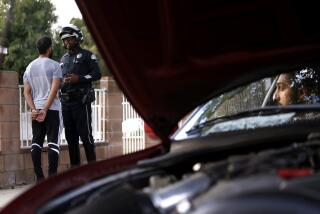Dirty Filter Calls a Halt on the Freeway
- Share via
Question: I have a 1981 Buick Skylark with 19,500 miles on it. I was driving on the freeway at about 65 miles per hour when the car suddenly lost power and stopped. After 10 minutes, the car started, and I drove 55 miles per hour with no more trouble. I had the fuel filter changed, and it has worked well since. Why did it stop so suddenly?--J.A.
Answer: Your experience is one reason why it is good practice to change fuel filters before they fail. Usually, you will not discover that you have a plugged filter until you are on a freeway, sometimes far from a service station or home.
Fuel filters tend to slowly accumulate dirt and foreign matter without any effect on the engine, but at a certain point they become plugged enough to prevent enough fuel from passing through. Usually this occurs at freeway speeds, which consume the most gasoline.
Apparently your filter allowed enough gasoline to pass through at 55 miles per hour, but not at 65 miles per hour. Also, when the car is allowed to idle for several minutes, a reservoir of gas will accumulate in the carburetor fuel bowl, which is enough to provide gasoline for a mile or more of driving.
You should change your filter periodically as recommended by your owner’s manual. If the filter is becoming plugged prematurely, you may have a contaminated gasoline tank that should receive immediate attention. If such contamination gets past the filter, it can plug up the carburetor and seriously damage the motor.
Q: My son has a 1983 Le Baron convertible that has a problem with the rear vinyl window clouding up. The dealer offers nothing but a new window. It seems to me that the window is badly designed and is a safety problem. Is there anything on the market that can dissolve the buildup or do we have to get another plastic window?--K.P.
A: If the clouding is caused by a buildup of residue on the surface of the plastic, it can easily be cleaned with any of a number of commercial plastic-cleaning products sold at auto-supply stores. But don’t use glass cleaners because they can sometimes damage plastic. The residue is usually caused by such things as cigarette smoke or vinyl fog, which is emitted from plastic fixtures in new cars.
You have a more serious problem if the clouding is occurring inside the plastic. Plastic used in convertible windows a decade or more ago often became brittle or yellowed in direct sunlight. Newer plastics are more resistant to sunlight and certainly should last longer than two years.
As a last resort, you may want to discuss your problem with a Chrysler factory representative.
Q: My 1980 Pontiac Phoenix stalls after standing overnight. It doesn’t seem to stall much after it is driven for a while. The carburetor has just been replaced, and since then I have taken it back to the mechanic twice. What should I do next?--A.H.
A: You don’t specifically mention that you have had your choke inspected, so you should start there. A cold stalling condition is usually caused by the engine not receiving a rich enough mixture of gasoline and air.
A choke increases the richness of the gas-air mixture that is burned inside the engine when it is cold. The choke is designed to slowly shut off as the engine warms up. Sometimes a heat-sensitive spring, which controls the choke, fails to operate.
Ralph Vartabedian cannot answer mail personally but will respond in this column to automotive questions of general interest. Do not telephone. Write to Your Wheels, You section, The Times, Times Mirror Square, Los Angeles 90053.
More to Read
Inside the business of entertainment
The Wide Shot brings you news, analysis and insights on everything from streaming wars to production — and what it all means for the future.
You may occasionally receive promotional content from the Los Angeles Times.










